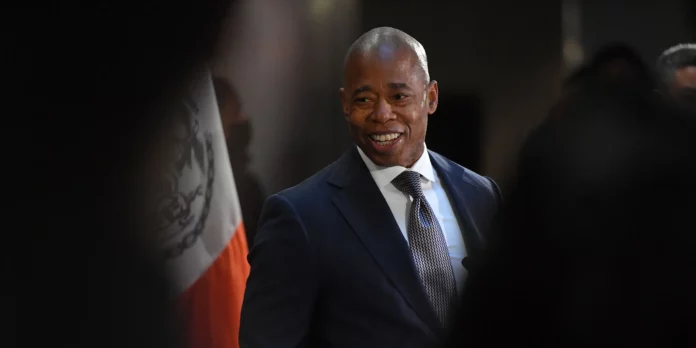Strings of pearls were hastily, desperately clutched by some who were present on February 28 in the New York Public Library’s glass-domed Fifth Avenue reception hall for this year’s NYC annual interfaith breakfast.
The necklace grabbing occurred when host Mayor Eric Adams dared to speak of the importance of the Creator in human lives. Not something one would expect to outrage attendees at a “faith” event. But it did.
To be entirely honest, the mayor’s choice of words at one point did comprise something of a red flag he waved before overly broadminded bulls.
“Don’t tell me about no separation of church and state,” he declared with a preacher’s cadence. “State is the body. Church is the heart. You take the heart out of the body, the body dies.”
“Separation of church and state” is how many describe the First Amendment’s statement that “Congress shall make no law respecting an establishment of religion, or prohibiting the free exercise thereof.”
And so, Mr. Adam’s cheeky “no separation” line was bound to ruffle some First Amendment-firsters’ feathers. Donna Lieberman, for one, the executive director of the New York Civil Liberties Union, said it rendered her “speechless.” (Not a bad thing, some might say.)
But the mayor’s words about body and heart were—pace the pearl clutchers—not only defensible but true. As he went on to explain:
“I can’t separate my belief because I’m an elected official. When I walk, I walk with G-d. When I talk, I talk with G-d. When I put policies in place, I put them in with a G-d-[focused] approach to them. That’s who I am… and I won’t apologize about being a child of G-d.”
And he then invoked a distinctly non-Jewish metaphor to make what was really a very Jewish point. Recalling his youth in Queens as he was learning how to box, he quoted his trainer telling him that he was losing fights because “you leave your best fight in the gym, and you’re supposed to take it into the ring with you.”
That, he said, is “what has happened to many of us. The synagogue is the gym. The church is the gym… You are not there to leave your best worship in the gym.”
Mr. Adams elaborated: “Cause if we are bringing our best fight in the ring, we would not have homeless in this city. We would not have a crisis of domestic violence… When we took prayers out of schools, guns came into schools.”
The mayor was not advocating governmental endorsement of, or laws favoring, any religion. The wisdom of some of his wordage aside, he was making an entirely valid, indeed crucial, point: Without awareness of a Creator, a society cannot be healthy.
Nor, for that matter, can it—forgive the word—progress. After all, civil rights is a cause endorsed by all but racial supremacists. The early abolitionists invoked the belief that all human beings were created —implying, obviously, a Creator—with unalienable rights. Leaders in the battle for civil rights were most often clergy, who regularly invoked Yetzias Mitzrayim in their speeches and songs.
A belief in a Creator, moreover, was something that the Continental Congress—the effective government of the 13 colonies that would evolve into our country—and that the Founding Fathers wholeheartedly embraced.
On March 16, 1776, for but one of many examples, the Continental Congress passed without dissent a resolution establishing a “Day of Humiliation, Fasting and Prayer,” in order “to have people of all ranks and degrees duly impressed with a solemn sense of G-d’s superintending providence, and of their duty, devoutly to rely…on his aid and direction…”
George Washington and Thomas Jefferson issued similar proclamations, with similar religious language.
To be sure, the Founders were, for the most part, Christians; that was the faith of their upbringings. But they spoke essentially as theists, believers in “Providence” and in the need for citizens to recognize moral and ethical imperatives.
Some of those imperatives, tragically, have been jettisoned by contemporary American politicians, courts and society. But hearing a public servant unapologetically endorse, even in general, the importance of religion in human and political affairs is heartening.
To read more, subscribe to Ami





















